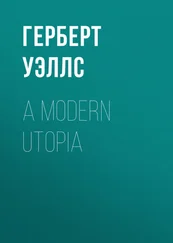Herbert Wells - A Modern Utopia
Здесь есть возможность читать онлайн «Herbert Wells - A Modern Utopia» весь текст электронной книги совершенно бесплатно (целиком полную версию без сокращений). В некоторых случаях можно слушать аудио, скачать через торрент в формате fb2 и присутствует краткое содержание. Жанр: Социально-психологическая фантастика, на английском языке. Описание произведения, (предисловие) а так же отзывы посетителей доступны на портале библиотеки ЛибКат.
- Название:A Modern Utopia
- Автор:
- Жанр:
- Год:неизвестен
- ISBN:нет данных
- Рейтинг книги:4 / 5. Голосов: 1
-
Избранное:Добавить в избранное
- Отзывы:
-
Ваша оценка:
- 80
- 1
- 2
- 3
- 4
- 5
A Modern Utopia: краткое содержание, описание и аннотация
Предлагаем к чтению аннотацию, описание, краткое содержание или предисловие (зависит от того, что написал сам автор книги «A Modern Utopia»). Если вы не нашли необходимую информацию о книге — напишите в комментариях, мы постараемся отыскать её.
A Modern Utopia — читать онлайн бесплатно полную книгу (весь текст) целиком
Ниже представлен текст книги, разбитый по страницам. Система сохранения места последней прочитанной страницы, позволяет с удобством читать онлайн бесплатно книгу «A Modern Utopia», без необходимости каждый раз заново искать на чём Вы остановились. Поставьте закладку, и сможете в любой момент перейти на страницу, на которой закончили чтение.
Интервал:
Закладка:
§ 2
What prohibitions should we be under, we two Uitlanders in this Utopian world? We should certainly not be free to kill, assault, or threaten anyone we met, and in that we earth-trained men would not be likely to offend. And until we knew more exactly the Utopian idea of property we should be very chary of touching anything that might conceivably be appropriated. If it was not the property of individuals it might be the property of the State. But beyond that we might have our doubts. Are we right in wearing the strange costumes we do, in choosing the path that pleases us athwart this rock and turf, in coming striding with unfumigated rücksacks and snow-wet hobnails into what is conceivably an extremely neat and orderly world? We have passed our first Utopian now, with an answered vague gesture, and have noted, with secret satisfaction, there is no access of dismay; we have rounded a bend, and down the valley in the distance we get a glimpse of what appears to be a singularly well-kept road....
I submit that to the modern minded man it can be no sort of Utopia worth desiring that does not give the utmost freedom of going to and fro. Free movement is to many people one of the greatest of life's privileges—to go wherever the spirit moves them, to wander and see—and though they have every comfort, every security, every virtuous discipline, they will still be unhappy if that is denied them. Short of damage to things cherished and made, the Utopians will surely have this right, so we may expect no unclimbable walls and fences, nor the discovery of any laws we may transgress in coming down these mountain places.
And yet, just as civil liberty itself is a compromise defended by prohibitions, so this particular sort of liberty must also have its qualifications. Carried to the absolute pitch the right of free movement ceases to be distinguishable from the right of free intrusion. We have already, in a comment on More's Utopia , hinted at an agreement with Aristotle's argument against communism, that it flings people into an intolerable continuity of contact. Schopenhauer carried out Aristotle in the vein of his own bitterness and with the truest of images when he likened human society to hedgehogs clustering for warmth, and unhappy when either too closely packed or too widely separated. Empedocles found no significance in life whatever except as an unsteady play of love and hate, of attraction and repulsion, of assimilation and the assertion of difference. So long as we ignore difference, so long as we ignore individuality, and that I hold has been the common sin of all Utopias hitherto, we can make absolute statements, prescribe communisms or individualisms, and all sorts of hard theoretic arrangements. But in the world of reality, which—to modernise Heraclitus and Empedocles—is nothing more nor less than the world of individuality, there are no absolute rights and wrongs, there are no qualitative questions at all, but only quantitative adjustments. Equally strong in the normal civilised man is the desire for freedom of movement and the desire for a certain privacy, for a corner definitely his, and we have to consider where the line of reconciliation comes.
The desire for absolute personal privacy is perhaps never a very strong or persistent craving. In the great majority of human beings, the gregarious instinct is sufficiently powerful to render any but the most temporary isolations not simply disagreeable, but painful. The savage has all the privacy he needs within the compass of his skull; like dogs and timid women, he prefers ill-treatment to desertion, and it is only a scarce and complex modern type that finds comfort and refreshment in quite lonely places and quite solitary occupations. Yet such there are, men who can neither sleep well nor think well, nor attain to a full perception of beautiful objects, who do not savour the best of existence until they are securely alone, and for the sake of these even it would be reasonable to draw some limits to the general right of free movement. But their particular need is only a special and exceptional aspect of an almost universal claim to privacy among modern people, not so much for the sake of isolation as for congenial companionship. We want to go apart from the great crowd, not so much to be alone as to be with those who appeal to us particularly and to whom we particularly appeal; we want to form households and societies with them, to give our individualities play in intercourse with them, and in the appointments and furnishings of that intercourse. We want gardens and enclosures and exclusive freedoms for our like and our choice, just as spacious as we can get them—and it is only the multitudinous uncongenial, anxious also for similar developments in some opposite direction, that checks this expansive movement of personal selection and necessitates a compromise on privacy.
Glancing back from our Utopian mountain side down which this discourse marches, to the confusions of old earth, we may remark that the need and desire for privacies there is exceptionally great at the present time, that it was less in the past, that in the future it may be less again, and that under the Utopian conditions to which we shall come when presently we strike yonder road, it may be reduced to quite manageable dimensions. But this is to be effected not by the suppression of individualities to some common pattern, [3] More's Utopia . “Whoso will may go in, for there is nothing within the houses that is private or anie man's owne.”
but by the broadening of public charity and the general amelioration of mind and manners. It is not by assimilation, that is to say, but by understanding that the modern Utopia achieves itself. The ideal community of man's past was one with a common belief, with common customs and common ceremonies, common manners and common formulæ; men of the same society dressed in the same fashion, each according to his defined and understood grade, behaved in the same fashion, loved, worshipped, and died in the same fashion. They did or felt little that did not find a sympathetic publicity. The natural disposition of all peoples, white, black, or brown, a natural disposition that education seeks to destroy, is to insist upon uniformity, to make publicity extremely unsympathetic to even the most harmless departures from the code. To be dressed “odd,” to behave “oddly,” to eat in a different manner or of different food, to commit, indeed, any breach of the established convention is to give offence and to incur hostility among unsophisticated men. But the disposition of the more original and enterprising minds at all times has been to make such innovations.
This is particularly in evidence in this present age. The almost cataclysmal development of new machinery, the discovery of new materials, and the appearance of new social possibilities through the organised pursuit of material science, has given enormous and unprecedented facilities to the spirit of innovation. The old local order has been broken up or is now being broken up all over the earth, and everywhere societies deliquesce, everywhere men are afloat amidst the wreckage of their flooded conventions, and still tremendously unaware of the thing that has happened. The old local orthodoxies of behaviour, of precedence, the old accepted amusements and employments, the old ritual of conduct in the important small things of the daily life and the old ritual of thought in the things that make discussion, are smashed up and scattered and mixed discordantly together, one use with another, and no world-wide culture of toleration, no courteous admission of differences, no wider understanding has yet replaced them. And so publicity in the modern earth has become confusedly unsympathetic for everyone. Classes are intolerable to classes and sets to sets, contact provokes aggressions, comparisons, persecutions and discomforts, and the subtler people are excessively tormented by a sense of observation, unsympathetic always and often hostile. To live without some sort of segregation from the general mass is impossible in exact proportion to one's individual distinction.
Читать дальшеИнтервал:
Закладка:
Похожие книги на «A Modern Utopia»
Представляем Вашему вниманию похожие книги на «A Modern Utopia» списком для выбора. Мы отобрали схожую по названию и смыслу литературу в надежде предоставить читателям больше вариантов отыскать новые, интересные, ещё непрочитанные произведения.
Обсуждение, отзывы о книге «A Modern Utopia» и просто собственные мнения читателей. Оставьте ваши комментарии, напишите, что Вы думаете о произведении, его смысле или главных героях. Укажите что конкретно понравилось, а что нет, и почему Вы так считаете.




